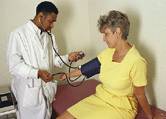- Could Your Grocery Store Meat Be Causing Recurring UTIs?
- Are You Making This Expensive Thermostat Error This Winter?
- Recognizing the Signs of Hypothyroidism
- 10 Strategies to Overcome Insomnia
- Could Artificial Sweeteners Be Aging the Brain Faster?
- Techniques for Soothing Your Nervous System
- Does the Water in Your House Smell Funny? Here’s Why
- Can a Daily Dose of Apple Cider Vinegar Actually Aid Weight Loss?
- 6 Health Beverages That Can Actually Spike Your Blood Sugar
- Treatment Options for Social Anxiety Disorder
Heart Studies Don’t Reflect Real-World Patients, Study Finds


People who take part in clinical trials of new heart disease treatments are generally younger and healthier than the typical heart patient, a new study confirms.
Experts said the findings, which appear in the Aug. 27 Journal of the American Medical Association, aren’t surprising — but they are troubling.
“It’s of major concern that clinical trials are enrolling a more select patient population that is not fully representative of the real-world patients encountered in clinical practice,” said Dr. Gregg Fonarow, a spokesman for the American Heart Association who wasn’t involved in the study.
“Doctors are left not knowing whether the therapy will be equally efficacious and safe for older patients with more [co-existing] conditions,” said Fonarow, who is also a professor of cardiology at the University of California, Los Angeles.
Dr. Jacob Udell, the lead researcher on the study, agreed.
Clinical trial participants “are not reflective of heart disease patients as a whole,” said Udell, a cardiologist at Women’s College Hospital in Toronto, Canada. “I think we need to do better.”
Udell cautioned, however, that people with heart disease should not be fearful that their current medications are unproven. “We’re not suggesting that people should worry about the medications they’re taking, or stop using them,” he stressed.
The finding that clinical trial participants are often relatively young and healthy is actually not new, Udell said. But his team was able to study data from a large number of heart patients at U.S. hospitals to put the issue into perspective.
The researchers used a registry run by the American College of Cardiology, which collected information on more than 140,000 patients treated for heart problems at 466 U.S. hospitals between 2008 and 2011.
Overall, 68 percent of those patients were potentially eligible for a clinical trial testing new heart disease treatments, Udell’s team found. But less than 5 percent of eligible patients ended up in a trial.
And when patients did enroll, they tended to be younger than non-participants, and less likely to have had a heart attack, stroke, or heart surgery in the past.
There are a few likely explanations, Udell said. For one, patients in better health are usually more open to enrolling in a study. That’s partly because entering a trial means you might be assigned to take a placebo, and not the real drug.
“If you’re feeling well,” Udell said, “you may be more likely to consider the benefit to others from taking part in a study, even if you may not personally benefit.”
On the other hand, study patients who get the real treatment have to accept the potential risks — which, again, may deter older patients in poorer health.
But it’s not only a matter of patients’ choices, Udell said. Researchers tend to select people in relatively better health, because they are usually better able to keep appointments, undergo tests and stick with treatment regimens.
Fonarow agreed, and added that doctors sometimes just “find it easier” to approach younger patients about participating in a trial, and to get informed consent from them.
Ironically, though, Udell said, “it’s often older, sicker patients who can benefit the most from a treatment.”
According to Udell, researchers should take advantage of existing patient registries, like the one used in this study, to boost clinical trial enrollment. He said his team’s findings show there is a “huge cadre” of patients out there who are potentially eligible for trials but aren’t participating.
As for people with heart disease, Udell encouraged them to “keep an open mind” if their doctor brings up the possibility of enrolling in a clinical trial.
Fonarow agreed that there is a “critical need” for clinical trials that are more reflective of real-world patients. In addition, he said, more studies need to follow the effectiveness, and risks, of heart drugs after they are out on the market.
More information
The U.S. National Heart, Lung, and Blood Institute has more about participating in clinical trials.
Source: HealthDay
Copyright © 2026 HealthDay. All rights reserved.










